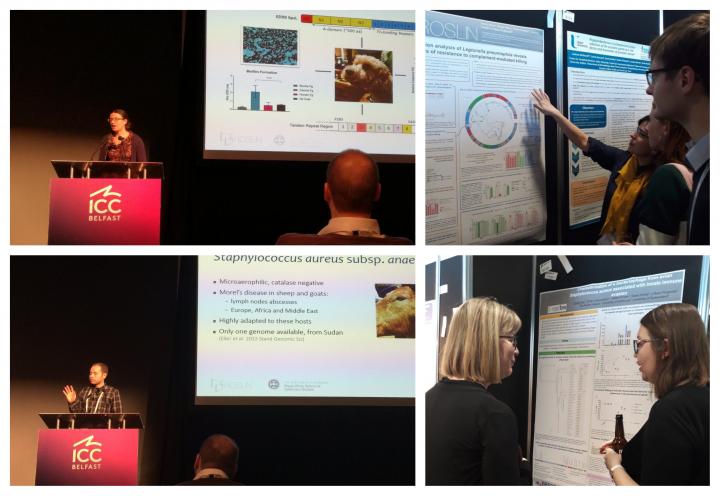LBEP contribution to Microbiology Society Annual Meeting 2019
Microbiology Society Annual Meeting 2019, Belfast
The LBEP team turned out in force for the Microbiology Society Annual Conference 2019 that took place at the ICC Belfast. It was a packed few days of Microbiology with lots of contributions from LBEP.

Amy Richards and Gonzalo Yebra presented back-to-back in the Non-human pathogens session. Amy Richards presented on “Host-specialised fibrinogen-binding by a bacterial surface protein promotes biofilm formation and innate immune evasion”. Amy outlined the characterization of a cell wall-associated protein of Staphylococcus pseudintermedius called SpsL and its interaction with fibrinogen. Using Atomic Force Microscopy, we have identified a high strength interaction of SpsL specifically with canine fibrinogen that promotes the infection phenotypes of bacterial aggregation and biofilm formation, potentially promoting the restriction of S. pseudintermedius to the canine host.
Gonzalo Yebra then presented on “Evolutionary genomics of the host-restriction pathogen Staphylococcus aureus subsp. anaerobius reveals extensive genome decay and signatures of adaptation”. Gonzalo described the genetic analysis performed on S. aureus subsp. anaerobius, the aetiological agent of Morel’s disease in sheep and goats that causes abscesses in the lymph nodes. This genetic analysis identified a massive gene decay through pseudogenisation and large chromosomal inversions. This work represents a remarkable example of drastic genomic changes that are likely to be leading to a highly specific niche adaptation – the lymph node of sheep and goats.
Joana Alves presented a poster entitled “Functional evolutionary genomics of Legionella pneumophila reveals the molecular basis of serum resistance among clinical isolates”. Joana studied the role of a Legionella lipopolysaccharide modification enzyme in the evasion of the human innate immune response. She showed that strains that harbour this enzyme are able to escape complement killing giving them an advantage to infect the human lung. Joana and Bryan Wee and working hard to get this data published so we hope you will be able to read it soon.
Emily Parr presented her PhD work in a poster entitled “Characterization of a bacteriophage from avian Staphylococcus aureus associated with innate immune evasion”. Emily investigated the role of the avian beta-converting phages in host-pathogen interactions showing that, without this phage, avian Staphylococcus strains have reduced extracellular growth in vitro in chicken bone-marrow derived macrophages, reduced initial phagocytosis and intracellular survival. These data will contribute new information relating to the evolution of avian S. aureus and mechanisms of bacterial host-adaptation.Good luck to Emily as she starts writing up her PhD thesis!
It was great that our first year PhD students were able to join us for their first Microbiology Society conference experiences. Josh Harling-Lee and Jamie Gorzynski particularly enjoying The Microbial Pangenome session while Fiona Sargison took the Passport to Prizes competition very seriously.
Thanks to the Microbiology Society for a great conference.

